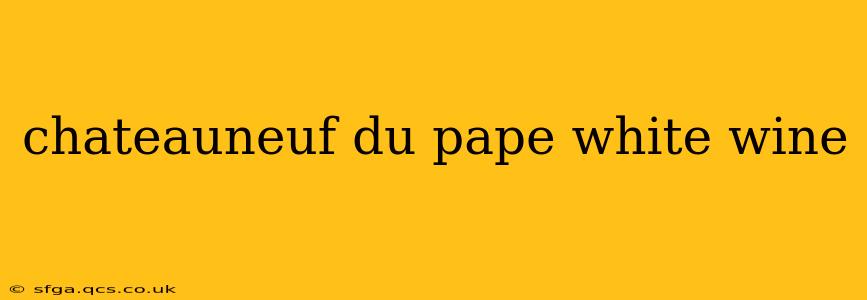Châteauneuf-du-Pape, a name synonymous with powerful, full-bodied red wines, might surprise you with its equally impressive white counterparts. While less prevalent than its red siblings, Châteauneuf-du-Pape white wine offers a unique and captivating expression of the Rhône Valley's terroir. This exploration will delve into the intricacies of this exceptional white wine, uncovering its characteristics, production methods, and what makes it so special.
What Makes Châteauneuf-du-Pape White Wine Unique?
The uniqueness of Châteauneuf-du-Pape white wine stems from several factors. Firstly, its allowed grape varieties are quite diverse, including Grenache Blanc (body and richness), Roussanne (floral aromas and acidity), Clairette (freshness and minerality), and Bourboulenc (structure and complexity). This blendability allows winemakers to create a wide range of styles, from rich and opulent to lean and crisp. Secondly, the terroir itself plays a crucial role. The Southern Rhône's gravelly soils, warm climate, and strong winds contribute to the grapes' concentration and distinctive flavor profiles. Finally, the rigorous regulations ensure high quality, limiting yields and enforcing strict production standards.
What are the common grape varieties used in Châteauneuf-du-Pape white wine?
As mentioned, several grape varieties contribute to the complexity of Châteauneuf-du-Pape white wine. The most prevalent are:
- Grenache Blanc: This provides the backbone, offering rich texture, body, and often notes of apricot and honey.
- Roussanne: Known for its floral aromas (think orange blossom and acacia), it adds elegance and a vibrant acidity.
- Clairette: Contributing refreshing acidity and minerality, Clairette brings a crispness that balances the richness of other varieties.
- Bourboulenc: This less common variety adds structure and complexity, contributing to the wine's overall weight and mouthfeel. It often imparts subtle herbal notes.
Other permitted, albeit less frequently used, varieties include Picardan, Picpoul, and Marsanne. The exact blend varies considerably depending on the winemaker and the vintage.
What does Châteauneuf-du-Pape white wine taste like?
The flavor profile of Châteauneuf-du-Pape white wine is remarkably diverse due to the blend of grapes and the winemaking techniques employed. However, some common characteristics emerge:
- Richness and Body: Many examples exhibit a noticeable richness and weight on the palate, a departure from lighter white wines.
- Aromas: Expect a range of aromas, from white flowers and stone fruits (apricot, peach) to honey, herbs, and even subtle notes of spice. The specific aromas are heavily influenced by the grape blend.
- Acidity: While rich, these wines possess a refreshing acidity that prevents them from being overly heavy or cloying. This acidity also contributes to the wine's aging potential.
- Minerality: A subtle minerality is often present, adding a layer of complexity and a sense of place.
How is Châteauneuf-du-Pape white wine made?
Winemaking techniques can vary, but generally, the process involves gentle pressing of the grapes to avoid harsh tannins, followed by fermentation in stainless steel tanks or oak barrels. Malolactic fermentation (a secondary fermentation) might be employed to soften the wine's acidity and add complexity. The aging process also varies, with some wines spending time in oak, while others remain in stainless steel to preserve freshness and fruitiness.
How much does a bottle of Châteauneuf-du-Pape white wine cost?
The price of Châteauneuf-du-Pape white wine is considerably higher than many other white wines, reflecting the quality of the grapes, the strict regulations, and the prestige of the appellation. Expect to pay significantly more than for a standard Rhône white blend. Pricing can vary based on vintage and producer, ranging from moderately expensive to quite pricey for top-tier examples.
Is Châteauneuf-du-Pape white wine worth the price?
Whether or not Châteauneuf-du-Pape white wine is "worth the price" is subjective and depends on individual preferences and budget. However, for those seeking a truly exceptional white wine with complexity, richness, and a unique expression of terroir, it certainly represents a significant investment. The quality and aging potential often justify the cost for discerning wine lovers. If you appreciate complex, full-bodied whites with remarkable depth, then the investment is often well-rewarded.
This exploration hopefully provides a comprehensive understanding of Châteauneuf-du-Pape white wine. It’s a testament to the versatility and exceptional quality of the Rhône Valley, proving that this region isn’t solely defined by its famous reds.
